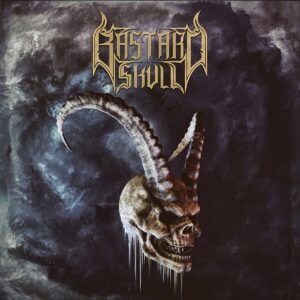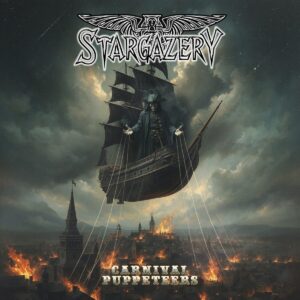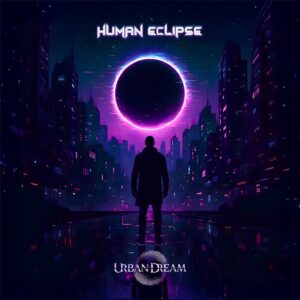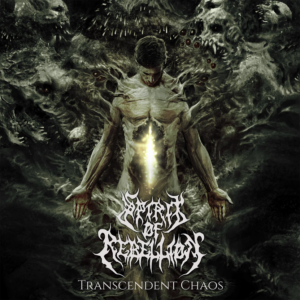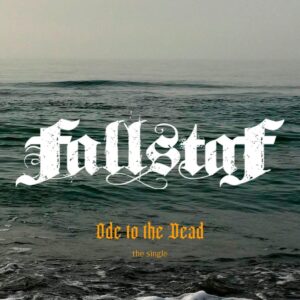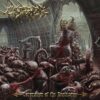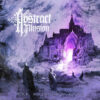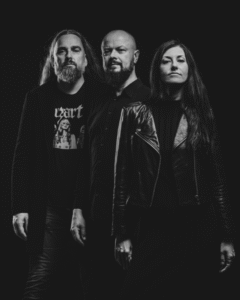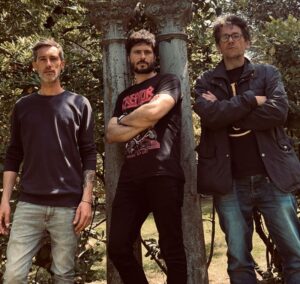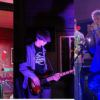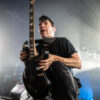Final Days
Orden Ogan
•
March 15, 2021
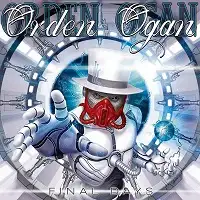
It's a really good thing for a band to be thorough. If the imagery and ideas on one album differ from the next, it's always good to show that in every possible way. Take ORDEN OGAN, for instance. Their previous album, 2017's "Gunmen," was filled with the sound, the stories, and the look of the Wild West, from the earth tones of the album cover to their clothing, all dusty leather and bolo ties.
When they decided to tackle outer space, artificial intelligence, and global annihilation, like they do in their latest, "Final Days," they acted accordingly - the album cover is all whites and blues and silvers, their clothing morphed into spiky shoulders and futuristic molded plastic. But the change isn't just superficial - this album sees the German power metal band doing their best work to date. Musically they've always been tight, but they've amped up their storytelling to match; there's a clear uptick in quality here. The songs are brief, the imagery powerful, the plotting sound. They are acutely observant of the world around them. Patrick replaces long-time guitarist Tobias Kersting here; a hand injury forced Seeb to stick to singing alone. He's come to the fore as an introspective front man, despite his flair for drama, and that's apparent from the opening track.
"Heart Of The Android" is trademark OO - tight, terse guitar melodies, precise drumming, especially good rhythm guitar work, great vocal harmonies. You definitely get that modern, sci-fi feel; it's all very clean, beautifully mixed. There's a definite story here, the android of the title telling it - the first verse is how he's been used by his human masters ("For 12 years now they shout and call my name" ... "I do my work by day and play their game"). In the second, he calls himself "a slave" and notes, "And this is something you can never have/Linger in pain lest we forget" and asks intriguingly, "Is this why you hate me?" like because I can't die? The chorus is that old question familiar to all "Star Trek" fans, "Is there a heart inside the chest of the android?/What do you see, machine or man?" - as we get closer to this kind of thing, the question of what is sentient is fast becoming a legitimate issue. The bridge, then, is kind of a catalog of what the android goes through ("Slowly degrade, deteriorate/Command and I will follow" and the pointed remark, "You rule this land of hollows," like we're not human and we know it and you make sure we know it).
Darker and more urgent as befitting the subject, "In The Dawn Of The AI" sounds actually colder, more forbidding. Super heavy and crunching in the verses, with a sparing use of blast beats (they don't pummel, just punctuate), this is part two, the uprising - the AIs have had enough and turned on their masters. The first verse describes the initial mistake ("They knew about the risk before they started to compile/Their source-code became self-aware ... They tried to pull the plug 'cause they could not delete the file/So arrogant and unprepared") and the first prechorus is the end is nigh ("This is our last historic day ... The extermination of mankind is under way/Perfect logic of a binary soul"). Another terrific, memorable chorus serves to foretell this eventual showdown - "Hail to the mind of man ... I've been waiting for you/On this day we die ... I've been destined for you"). The second verse is kind of looking back at how we got here ("A superior lifeform learns at a geometric rate/It played us off against each other ... Every conflict, every feud, it would instigate/Men would fight, kill one another"). And it's hard to emphasize enough how timely the second prechorus is: "And every webfeed was corrupt/Deepfaked news made allies enemies/Reality's a theoretical construct/We're drifting in a world past remedy." If the verse was how we got here, the prechorus is saying we're already here. The solo sections, with the crazed, atonal keyboards and frantic drumming, perfectly accompany the action, the spiraling out of control. And the distorted vocal at the end on the last lines of the chorus is perfect, the final transition from man to machine.
With its techno, buzzing keyboards before the guitar riff, "Inferno" is a great transition from the previous tracks - it's almost poppy-sounding, brilliant and bright, but that's not a bad thing. This is commentary, maybe not necessarily a part of the story, but again perhaps how we got here, and the need to cleanse ourselves (i.e. "burn it down" and "The only cure for this society is to burn its slaves in their anxiety"). And again it couldn't be more current in its observations ("They got their worldview engineered, exposed for quite some time/Where the truth is changed at will, just the lies will shine" - indeed - and "They took a chance, chose one extreme ... You'll see they'll build a new regime and construct their world of hate"). The second verse continues that critique: "An indoctrinated attitude, wrong in every way/Wipes out sober reasoning, heralds the end of days." Another super chorus, memorable and rich, has a simple lyric but you can't get it out of your head. The solo section repeats the sounds from the start, the vocal stripped way down in the mix, and then it builds gradually in intensity and volume, serving as a great lead-in to the guitar solo before it all mutates into a modulated chorus.
"Let The Fire Rain" has a slower, almost hymn-like quality; it's anthemic, like a war chant or a mantra. The one-sentence lead-in to the chorus is so effective, and Seeb sings it in an understated, low-key way that makes the cathartic chorus pop. This again is the fire metaphor as being necessary and cleansing, as yet another glorious chorus notes, "And everyone will be lost/Whether sinner or saint," like we just need to start over, to "Bring about their downfall." The solo section, with its chanted wordless vocal melody, adds to that kind of military feel. Seeb's vocal flights over the last chorus are noticeable without being distracting, and he sings the last lines with appropriate, weary finality - "You'll know we'll be done/You know we'll have won."
Fast paced and decisive, "Interstellar" gives the feeling that it's going down, not just musically but lyrically, in the first verse - "Our leaders in their great and unmatched wisdom speak today/The nation eagerly awaits for what they will have to say/Our beloved home country just came under attack/We mobilize our forces to eliminate the threat" - and the chorus lead-in, "We stand together in the war to come." It's not completely apparent who is speaking here - the androids, their masters? (when they say, "Destroy and obliterate, every last one of them must be gone," who is talking about whom?) Or is this just another part of the overall story arc? Regardless, the chorus is as stirring and uplifting as a literal call to arms should be ("Hold your heads up high/Stand your ground all unified/If you never surrender, you will never fall"). The guitar melody that leads into guest guitarist Gus G's solo is just as strong as the solo itself; when Neils and Patrick repeat the chorus melody before the final vocal run through, it's great continuity. It's interesting how the repeating of the line "If you never surrender, you will never fall" at the end opens up musically, giving it the feeling that there's a shadow of doubt creeping in, like we're saying this to boost our confidence because it might be fading.
"Alone In The Dark" is a power ballad, yes, but it's also an exercise in restraint. It begins and ends with a heartbeat, which alludes to the line in the chorus ("Still my heart is beating somehow"). Musically it breaks no new ground, following the ballad playbook pretty faithfully, but it never gets out of hand or melodramatic. These are two people separated by this pending tragedy (you get just a hint at it - "I never thought it could be real," Seeb sings; "I know some people think there was still hope out there," guest vocalist Ylva Eriksson of BROTHERS OF METAL sings) and they acknowledge, "We had our choice/We made it," like we can't waste time on regrets. How great are their individual vocals here - his lovely stark harmony in his chorus; her quiet, almost flat delivery in her verse, conveying weariness and loneliness and despair; the terrific vocal overdubs in her chorus. When they blend in the chorus, it's so seamless, and she actually provides the lower harmony. The bridge is only a tiny bit bigger, and it's so tragic - "So we drew the curtains/Cause now we know for certain/There'll be no day after the night/And you see that there is/Nothing deep in the abyss/So we gave up and stopped to fight," like all their hopes and dreams were put on hold for this last fight. The final chorus is wrenching, as it should be, but it ends hushed and resigned.
The next two tracks are kind of about personal responsibility. Thematically and metaphorically, "Black Hole" makes the overarching story idea of universal "annihilation" more intimate, like you can bring about your own personal end ("Crushed out in your own black hole," "As you are drawn into your own black hole"), as if we brought it on ourselves because we were "Hollow, callous, suicidal, queen of all your sorrows." Here, among many instances, is where you appreciate Seeb's production techniques and his attention to detail - the precision of the pace and tempo, the overdubbing on the key lines in the verses (like "Can't escape annihilation, the saddest fate is found"), the downward spiraling of the guitar part in the prechorus (it so conveys that helplessness of the lyric, "World destroyer, no way out/Cosmic terror"), the perfection of the transition between it and the chorus (and how one line leads so logically into the next thematically). After the solo section, the guitars do the prechorus melody on their own before the words are added in. These little touches make the songs so satisfying to listen to.
"Absolution For Our Final Days" begins acoustically with a quiet, intense take on the chorus - the bursts of Dirk-Meyer's razor-sharp staccato drumming bring tension to his more legato base rhythm in the verses. Again the tie-in between the short verse and the chorus is just done so well (..."followers of the beast...and you...You ask forgiveness," etc.). The second verse is blunt and no-nonsense: "It's right to grieve and quail after a lifetime of betrayal/Still you abdicate your every responsibility/We will get what we deserve." Ouch, like don't say you're sorry now because it won't help. Not only does it use the word "absolution" in the title, the first line in the chorus is, "You ask forgiveness, as if the words we say/Could cure this sickness/And it doesn't matter anyway/Witness our failure, there is no other way," as if to say don't do penance because it's too late. The choir-like backing vocals on the last chorus serve as divine judgment, another really thoughtful touch and one used at several other judicious points before we end.
Those choir vocals, along with slashing guitars, herald the pending doom of "Hollow" and serve the same purpose as they do in "Absolution" - like I said, they don't miss a trick. This is another example of pointed social commentary on so many fronts - it's clear that their time in lockdown clearly resonated with them. The verses are furious and angry: "Be sure they'll find another reason, a cause to fan the flame/To justify their actions and to camouflage their game/Dissent is labeled treason and the process stays the same/By the mass they will get silenced, outright branded with ill fame," they say in the first - sound familiar? The second is equally direct: "Hollow faces on the big screen/Controlled by the unknown/Silence the sovereigns/Bring sickness for all/Feed them cash and power/And teach them to condone/And soon they'll reign over dead men." The chorus decries those "hollow minds, hollow souls" and warns, "beware of their way or turn also hollow," but the bridge reminds that "we can't stem the tide and turn back time/Resort to violence/An act of self-defense." And it will end badly - "What you'll find along the way/It will break your back/Leaves you behind among the dead" - so it's inevitable that "You'll turn also hollow." When it ends on the word "hollow," the mix mimics that sound - it's shallow, ringing, almost bottomless
The band's bio says that the closing track "It Is Over," is about "the end of the world caused by an asteroid impact," ending in "the last radio broadcast of mankind presented in all the world's languages." The somber piano marked by touches of electronica (so fitting with the theme) gives way to guitar punches that take over and incorporate the piano melody, but it still remains hauntingly beneath. The verses are what we are leaving behind, and the parallels in the first and second are truly well done:
"Mother/You gave us warmth in these dark days" and "Mother/All that you bore will die at last" - this is the Earth, that it will be no more;
"Father/You did your best in your own way" and "Father/None of your values will be passed" - perhaps this is God, that religion will now be meaningless;
"Brother/I wish I'd see you by our side" and "Brother/Your noble goals were all in vain" - perhaps this is men, like why couldn't we have worked together;
And "Sister/Everything will be alright" and "Sister/Come let me take away the pain" is perhaps women - the caretakers, the reassures, the nurturers.
The chorus is bleak - "Now the night has come/Everything is said and done/Can't you see that is it over?" It's hopeless and final and full of grief and pain. The dystopian spoken section, a blend of male and female voices in that final broadcast, is devastating. It speaks of ships on their way to Mars carrying settlers to build a new society and the voices say, "If there is any comfort for us, the ones who have been left behind, then it is that we, as a race, have a chance to survive." But the truly heartbreaking part comes with, "We hope you are with your loved ones, but even if you are alone, today nobody is alone. Today we are all together ... 5 seconds to impact. God bless the human race." Then the chorus again, the word "now," and a reprise of the opening music.
This leaves you with bone-deep chills, horror, emptiness, almost inevitability too, like it is absolutely not far-fetched that this very thing could happen in this very manner. It leaves you deeply shaken - if it doesn't, I worry about you. It's borderline painful to listen to - mission very successfully accomplished. With "Final Days," ORDEN OGAN has done what the best science fiction does - finds the humanity in the mechanical, for one, and reminds us that the future is very close to being the present if we don't shape up. An outstanding effort from start to finish that stays with you, not only for the catchiness of the songs, but also for the sobriety of the message.
10 / 10
Masterpiece
Songwriting
Musicianship
Memorability
Production

"Final Days" Track-listing:
1. Heart Of The Android
2. In The Dawn Of The AI
3. Inferno
4. Let The Fire Rain
5. Interstellar
6. Alone In The Dark
7. Black Hole
8. Absolution For Our Final Days
9. Hollow
10. It Is Over
Orden Ogan Lineup:
Sebastian ("Seeb") Levermann - Vocals, Keyboards
Neils Loffler - Guitars
Patrick Sperling - Guitars
Steven Wussow - Bass
Dirk-Meyer Berhorn - Drums
More results...
